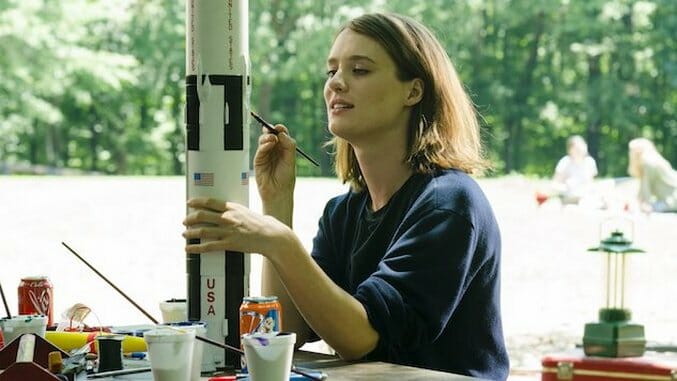Halt and Catch Fire: The How(e) of It All
(Episode 4.06)
Photo: AMC
One of the strengths of Halt and Catch Fire is its commitment to subtleties. It’s a series that sneaks up on you week after week, seeming to ramble along before knocking you flat, and “A Connection Is Made” is the ideal example. So much happens that I’m hard-pressed to detail it, and yet it happens delicately, unobtrusively—with a cartwheel in the kitchen and the repetition of a couple lines; with a conversation in a diner and the matching tattoos on a woman’s chest; with meetings and modems and model rockets, soaring up and sailing down on their steep-but-gentle trajectory. Even its arguments and arrests are designed to reveal drama, not to create it: The scene Haley (Susanna Skaggs) causes at Comet stems from the same feelings she expresses to Joe (Lee Pace); the flashing lights in Donna’s (Kerry Bishé) mirror are a reminder of the shape she’s in, rather than the problem’s introduction. Following the fan site Cam (Mackenzie Davis) comes across as she sorts through her email, Halt and Catch Fire focuses on process, on the small steps by which we measure change, restricted as we are to the constant present. It’s not what happens that matters, but why and wherefore—the how of it all.
Consider the series of events that brings Donna to her DUI, woven together so intricately that they carry their own momentum. There’s her remorseless decision to force Cecil (Cristian Gonzalez) out of Rover, which leads to her soused meeting with the prospective CTO. There’s Diane’s (Annabeth Gish) decision to propose to Bos (Toby Huss) after his heart attack, which leads him to confess his debts and Cam’s involvement in writing Rover’s algorithm. There’s Diane’s harsh criticism — “Get yourself together, Donna. I’m tired of holding your hand.” — which leads Donna to pour herself a glass of wine in the mid-afternoon and recite her compliment for Joanie (Kathryn Newton) again, leaching the words of their loving glow. There’s the need to return to the bar where she wooed the CTO — to Rover, into bed — to recover her wallet, which leads to that long, tense, darkly beautiful sequence in the car, singing along to Pat Benatar as circles of light bend and blur in the background. On their own, each is an intermediate stage in Donna’s spiral; together, they comprise a portrait of a woman holding on for dear life, as if the narrative itself were the pinpricks of color in a pointillist’s painting.
The same might be said of Joe’s fascination with Haley’s idea of the Internet, a place in which it’s possible to dispense with pretending, projection; or of the knowing smile that passes across his face when he sees Haley’s own fascination with Vanessa, and in it, perhaps, himself; or of the comparison he draws for Gordon’s (Scoot McNairy) benefit; or of Gordon’s recognition of the bird from the rocket, and with it his understanding of what Joe meant by “She’s a little like me.” The same might be said of Cam’s eye-rolling reaction to Joe’s awful taglines for Comet (“Search it. Find It. Comet.”); or of Gordon’s gentle accusation that she’s acting like she’s washed up at 32; or of her discovery of “The Howe of It All”; or of her being a “world builder”; or of her decision to install a modem in the Airstream and re-establish connection. The same might be said, I want to suggest, of life itself, the long, intermediate stage between birth and death that we navigate with a series of mostly small steps, and in which the flying leaps—getting married, having kids, buying a home, starting a company—are celebrated by a kind of synecdoche, the weddings and showers and housewarming parties and IPOs mere stand-ins for the infinite and often inexplicable decisions that comprise the rising action of everyone’s story.
By the time the connection is made in “A Connection Is Made,” capped by the dial-up modem’s distinctive noise, Halt and Catch Fire proffers the belief that it’s all connected. “On the Internet, you can be who you really are,” Joe repeats after Haley, but it’s not because one’s presence on the World Wide Web is a uniquely honest expression of her hopes and dreams, fears and failures. It’s because the keystrokes by which we create a website or catalogue others’, by which we write an algorithm or build a world, condense the choices that define us into a span of time far more manageable than the average life. On the Internet, you can be who you really are at this particular moment; it’s harder to account for who you were, or might one day be. It always is, whether online or off: “You’re all you,” as Gordon says to Donna after her release, turning her laughter into tears. “All the versions. You’re the same person that you always were, and I love that person.”
Matt Brennan is the TV editor of Paste Magazine. He tweets about what he’s watching @thefilmgoer.







































